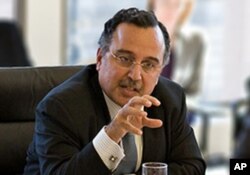Growing international concern about the nature of Iran’s nuclear program has renewed calls for a nuclear-free Middle East. At the annual meeting of the International Atomic Energy Agency earlier this month, Egypt led calls for Israel to join the Nuclear Non-Proliferation Treaty and subject its facilities to international inspection. Israel, which is widely believed to have nuclear weapons, says it will sign the pact only when there is comprehensive peace in the region.
Nabil Fahmy is Dean of the School of Public Affairs at the American University in Cairo. He was Egyptian Ambassador to the United States from 1999 to 2008. Ambassador Fahmy also chairs the Middle East Nonproliferation Project at the Center for Nonproliferation Studies, Monterey Institute of International Studies, Monterey, California.
(click below to listen to the entire interview):
Hilleary: What is the nuclear landscape of the Middle East today?
Fahmy: Very troublesome. Every country in the Middle East, except Israel, is a member of the Non-Proliferation Treaty (NPT). Nevertheless there are questions not only about the Israeli program but also about the Iranian program because of discrepancies in the applications of the safe guard agreements. So rather than have a Middle East that is safe from nuclear weapons 40 years after the treaty entered into force, we still have problems of a completely unguarded safe agreement and one where there may be a lack of full compliance.
Technology ultimately will, like the osmosis process, will ultimately filter into different industries in different countries. So unless you have a political symmetry of obligations against proliferation and full adherence to the Non-Proliferation treaty, you are bound to have problems in this regard in the future and I hope we don’t move in that direction in the years to come.
Hilleary: Would you say the NPT is obsolete?
Fahmy: No, I’d say it’s aging. And if it doesn’t get into a new lifestyle program it will ultimately not be compatible with the challenges of the future.
Hilleary: What would you say are the major impediments to a nuclear free zone?
Fahmy: The Israeli lack of adherence to the Non-Proliferation Treaty.
Hilleary: So what’s required of Israel?
Fahmy: Well, you cannot establish a zone free of nuclear weapons in the Middle East unless all the countries commit to becoming non-nuclear, at least. The Israelis have not made that commitment. So either they do it globally by acceding to the Non-Proliferation Treaty; or they do it regionally, by starting to negotiate a zone free of these weapons in the Middle East.
Hilleary: Are there any parallels between the standoff with Iran today and what we saw some years back with Saddam Hussein, who may or may not have exaggerated his own weapons capability to keep face with other powers in the region. Do you believe that Iran is working toward and already has weapons? Or do you believe it’s some posturing?
Fahmy: That’s an extremely interesting question. Frankly if anyone was to draw conclusions from Saddam Hussein’s experience, I wouldn’t try that bluff again because obviously he did not have the weapons after the IAEA (International Atomic Energy Agency) and UNSCOM (United Nations Special Commission) started to apply the investigations. That’s when he stopped.
However, I do believe that Iran is looking at a variation of the North Korean case, where Iran may not want to actually pursue nuclear weapons per se, but they probably want to have a latent capacity to go nuclear if they decide to go nuclear.













